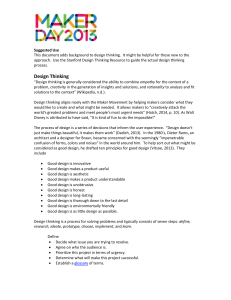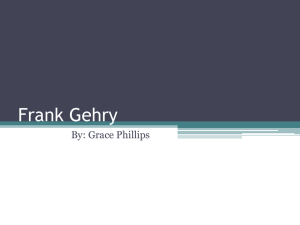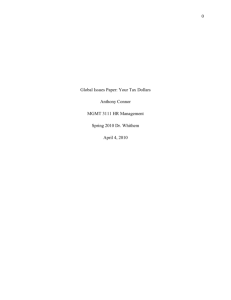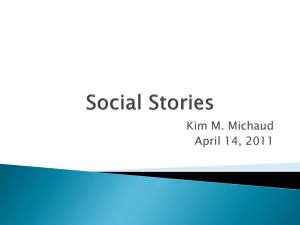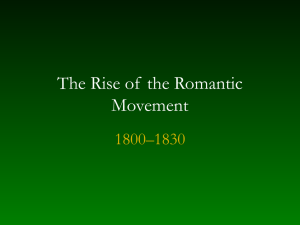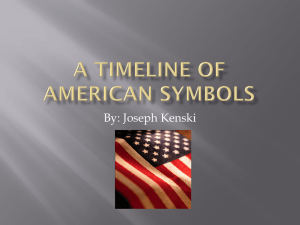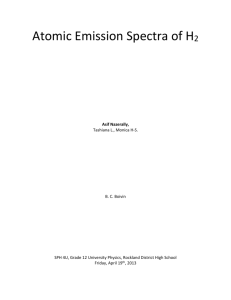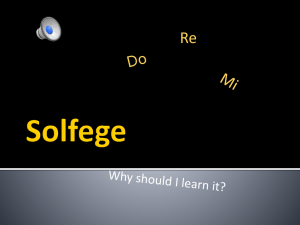Romantic Period - ajsorchestras.org
advertisement
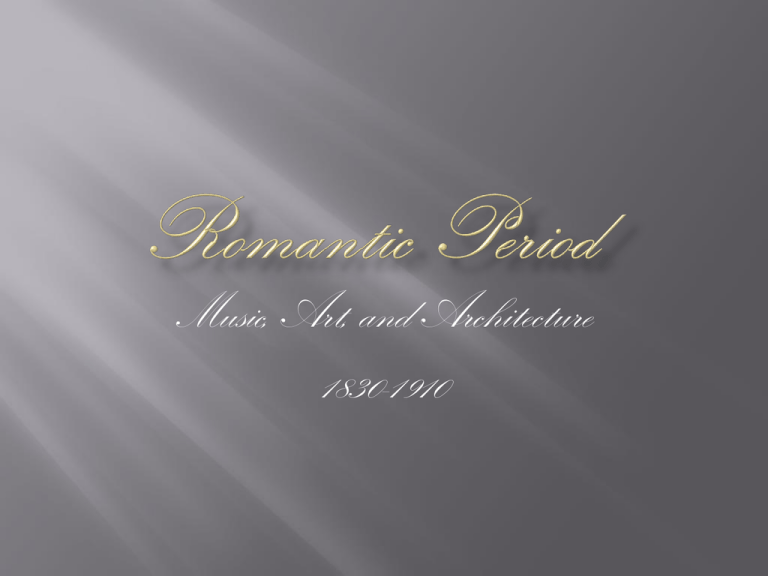
Music, Art, and Architecture 1830-1910 Carrie Finnegan SPE 536 July 8, 2011 Dr. Barbara Hof Gordon Lesson plan 3 • Music • • • Art • • • • Passionate and expressive Formal structures Mainly in France Impressionism! Softer edges and intermingling colors Architecture • • Many memorials and landmarks Lots of growth in the U.S. • Impressionism Originated in Paris in the late 1800s. • Many outdoor scenes • Named derived from Monet’s painting “Impression, Sunrise” • Artists: Claude Monet, Pierre-Auguste Renior • • Post-Impressionism • • Different techniques derived from Impressionism Artists: Vincent van Gogh, Paul Cezanne Impression, Sunrise, 1872 Bridge Over a Pond of Water Lilies, 1899 Self portrait, 1888 The Starry Night, 1889 • • • Expressed progressive social and political ideals Many memorials and landmarks were built during this time There is a building boom in Chicago following the Great Chicago Fire of 1871 The U.S. Capitol building receives a new dome in 1855 • 1858 – competition to design Central Park is won A map of Central Park from 1875 Central Park as it is seen today Built in 1889, the Eifel Tower is a global icon of France The Woolworth Building was constructed in the neo-Gothic style and was designed by Cass Gilbert. It opened in 1913 as the world’s tallest building. It cost $13 million to build. • • • • Mahler, Wagner, Tchaikovsky Does not refer to romantic love although that was a prevalent theme in many works Increase in emotional expression Nationalism – composers wrote music for their country • • • • • • • • Freedom in form and design Lyrical melodies, bold harmonies Ambiguous rhythm and meter Wide range of pitch, bold contrasts Dense, weightier textures Expansion of the orchestra Program music Greater technical virtuosity • • • • • Born in Leipzig, Germany Composer, conductor, theater director, essayist Primarily known for his operas Complex texture, rich harmonies and orchestration Wrote both the music and the libretto for his operas (not common for this time period) • • • • • Russian Wrote symphonies, operas, ballets, instrumental, chamber music, and songs Emphasis on national character in music Strived to link those ideals to a standard to meet Western criteria Built an “emotional experience of almost unbearable intensity” • • • Austrian Late Romantic period Leading conductor of his time • • • Conducted the Vienna Court Opera for 10 years Briefly conducted New York’s Metropolitan Opera and the New York Philharmonic Compositions included 10 symphonies (largescale works) and a number of songs and piano works This caricature mocked Mahler’s conducting style in a 1901 humorous magazine. This cartoon mocked Mahler’s use of instrumentation. The caption reads “My God, I've forgotten the motor horn! Now I shall have to write another symphony." 1. 2. 3. How is music from the Romantic period different than music written in the Baroque and Classical periods? Are any of the pieces we have played in class from the Romantic period? Based on what you have just learned about the Romantic period, what other composers have you heard of from this time? Architect of the Capitol. (n.d.). Architecture. Retrieved from http://www.aoc.gov Central Park. (2010). The Official Site. Retrieved from http://www.centralparknyc.org Google. (2011). Google Images. Retrieved from http://www.google.com/images Stolba, K. M. (1997). The Development of Western Music (3rd ed.). Columbus, OH: McGraw-Hill. Wikipedia. (2011). Post-Impressionism. Retrieved from http://www.wikipedia.com Wikipedia. (2011). Program music. Retrieved from http://www.wikipedia.com Wikipedia. (2011). Richard Wagner. Retrieved from http://www.wikipedia.com Wikipedia. (2011). Romantic music. Retrieved from http://www.wikipedia.com
